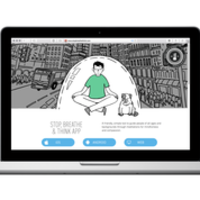Monday, December 19, 2016
Stop, Breathe, and Think: Using Your Smartphone To Tackle Your Emotional Health

As we head towards the end of the year, a lot of people are starting to think about New Year's resolutions, and how to improve their life. One area is to improve your emotional wellness and health. Los Angeles-based Stop, Breathe, and Think (www.stopbreathethink.org) has created an app to help you have better awareness of your emotional health, and—using meditation and other exercises—helps you gain better mastery over your emotions. We caught up with co-founders Julie Campistron and Jamie Price on the startup. (Photo: Jamie Price on left, Julie Campistron on right)
What is Stop Breathe and Think?

Julie Campistron: Our app, Stop, Breathe, and Think is in the emotional wellness space. It allows you to check in on how your are feeling, what your emotional state is, and what your top emotions are, and aligns those with short, meditation recommendations, and other type of short activities to deal with those emotions. You can track your progress, and we provide you with stickers to support you along the way, and help motivate you to look at your emotional state over time.
How did you start the company?
Jamie Price: The app originated when I was at a nonprofit back in 2000. I was an investment banker, and happened to meet a Tibetin Buddhist Lama on how to meditate. At the time, there happened to have been a lot of gang violence where I lived in Glendale. I thought that the skills of mindfulness and meditation could help kids completely change their lives. I helped figure out how to teach and communicate it, to help them relate to it and understand and put it into practice. I joined the Lama at a nonprofit called Tools for Peace, and since then have been developing curriculum and teaching meditation for the last sixteen years. I saw that, if we could create an app teaching what we had been working with the kids for year son, we could reach many more children, and also support the ones we were working with between our programs. In January of 2014, we launched the app, Stop, Breathe, and Think, and just attained incredible grassroots success. We also found we had a much, broader audience than we thought. It was so successful, we found that it was not sustainable as a nonprofit, because we were not able to raise the funds necessary to keep it going. That's when we decided to take the app, and put it into a public benefit corporation, and I reached out to Julie and we partnered to create this new entity.
How did you two meet?
Jamie Price: Our husbands have been close friends since high school. We have known each other for four years. We had been married at about the same time. She was looking for some advice on what to do with the app, and she had the exact experience I was looking for based on her background. I met with her, and even though the intention wasn't necessaril to work together, after one meeting, it was really clear there was a huge potential here, and she was exactly the right person to help us realize that.
Does it seem odd to you that you've used a device often blamed for hindering mindfulness, the smartphone, to promote mindfulness?
Jamie Price: We felt like we wanted to reach the kids where they were, which was on their phones. It's actually been a really effective strategy, and we're taking what they were doing all day long, and redirecting that into a much more constructive direciton.
Julie Campistron: People have crisis, have angst, and stress at any point in time, and their phone and device is the thing that is accessible to them most of the time. We're able to be there, and help provide a bubble of calm, and tools to help them gain more peace of mind. That's really powerful. That said, a phone is definitely a device that can add to your stress. But, in this instance, we're leveraging the fact that people are carrying their phone everywhere, to make it a tool to let them take a break.
Explain why you decided to become a Public Benefit Corporation?
Julie Campistron: It was definitely there from the get go, because of the history of the company being borne out of a nonprofit. We wanted to maintain that ethos, and continue supporting the mission. For us, it was really about developing a business and making it sustainable, yet to keep on supporting that mission. The Public Benefit Corporation status helps you balance shareholders and stakeholders. We though that was important to communicate that during our fundraising, to help people understand that, although we are building a business, at our core, our mission is emotional wellness, making it accessible to as many people as possible. That drives our decisions. That's why a pretty large portion of our app remains free, so that people, whether or not they can afford a subscription. Although that decision might be a little counter to business at times, it's important for us to maintain that access. It's really a decision from the get-go to communicate that, so that we could have people who would be supportive of us.
Are subscription revenues the way you make money?
Julie Campistron; We just launched our subscription service. It's mostly been free, with in-app purchases. About a month ago, we launched our subscription layer. Everything that was free before is still free, but we've added lots of content behind the subscription. With our membership, there is a monthly option and an annual option, which lets our members access a ton of more meditation and tons of content. That's our model moving forward, at least in the early stages.
What's the biggest lesson learned so far with the startup?
Julie Campistron; The fundraising process was really interesting. We were first time fundraisers. It was a big learning experience for us, to figure out how it works, who to go to, and how to hone the pitch, and what structure to use. There was a ton of learning there. Another thing, which might sound obvious, is how prioritization and sequencing is so important. That's something we learn every day. What really matters, is what moves the needle. You're always under-resourced, and you constantly have to think about if what you are doing will get you to the next milestone. That's something coming from a bigger company that you don't have to deal with much. It's much more dire in startup mode, and it's really important to move the needle.
Jamie Price: For me, it's a little broader. I think the experience over the last year, is I've gained the confidence to stick to the vision. Although you have to adapt to realities of the situation, and learn from actual data and feedback, and from everything you do, you also have to have a clear vision of what you we want to do. There are many different options on how to go about it, and I think I've learned the best thing is to stay true to the destination we've chosen for ourselves.
Finally, what should we be watching from you for the next year?
Julie Campistron: We're really developing into a broader, emotional wellness brand. Look for more activities, different emotions and content, which is really a key for us. We're always responsive to the emotional data, and we believe in distributing our experience across different kinds of platform. We recently launched on Slack and Alexa, and we will be providing our experience on different platformsf. For us, it's important that we really start developing our brand on those platforms, and reaching users where they are.
Thanks!